This feature story, reflecting a partnership between High Country Sports and High Country Press, also appears in the August edition of High Country magazine, with even more photographic images.
By David Rogers. BOONE, N.C. — Since it was first codified in the middle of the 19th century, the uniquely American game of baseball largely survived the winds of change. Technology brought instant replay to TV monitors, digitized strikes zones, and aluminum bats, but the bases are still roughly 90 feet apart and the pitcher’s mound 60 feet from home plate.
Nine players make up a team and the pungent smell of linseed oil still makes the leather glove more pliable after hanging in the closet all winter. Artificial intelligence may soon replace umpires in calling balls and strikes, but the players’ respective missions remain the same: throw the ball, hit the ball, catch the ball and tag a runner out.
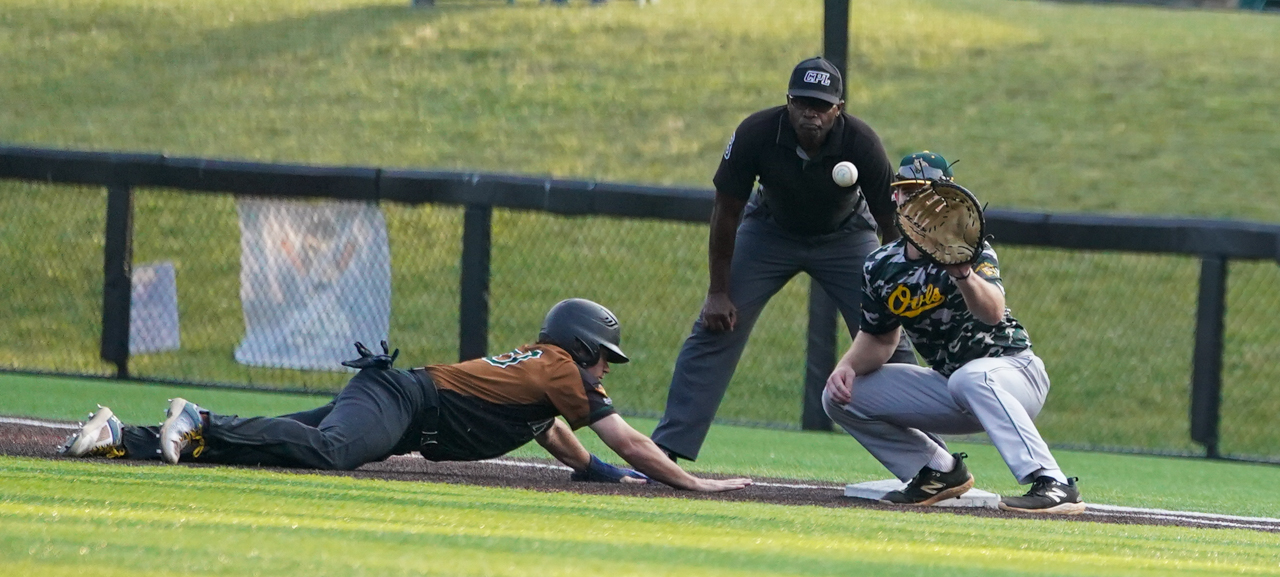
The crack of a bat in a corner of the city park still brings curious smiles to passers-by who stop to watch a kid run to first base while another chases the ball rolling to the right field fence. The throw from the outfield is more of a desperate heave, skying into the air before falling into the outstretched glove of an infielder, the tag just missing as the batter-turned-sliding-runner arches around impossibly to grab second base, the umpire spreading his arms wide while yelling “safe!”
Big league scouts still scour rural sandlots, hoping to discover hidden talent, listening intently for the decisive smack of a 9-inch horse-hided orb being delivered into a catcher’s mitt, a decisive sound that just might foreshadow discovery of the next Whitey Ford, Nolan Ryan, and Randy Johnson of yesteryear, or maybe the next Aroldis Chapman of the present day.
Speed and power command each decisive moment in baseball, reflexes pitted against reflexes.
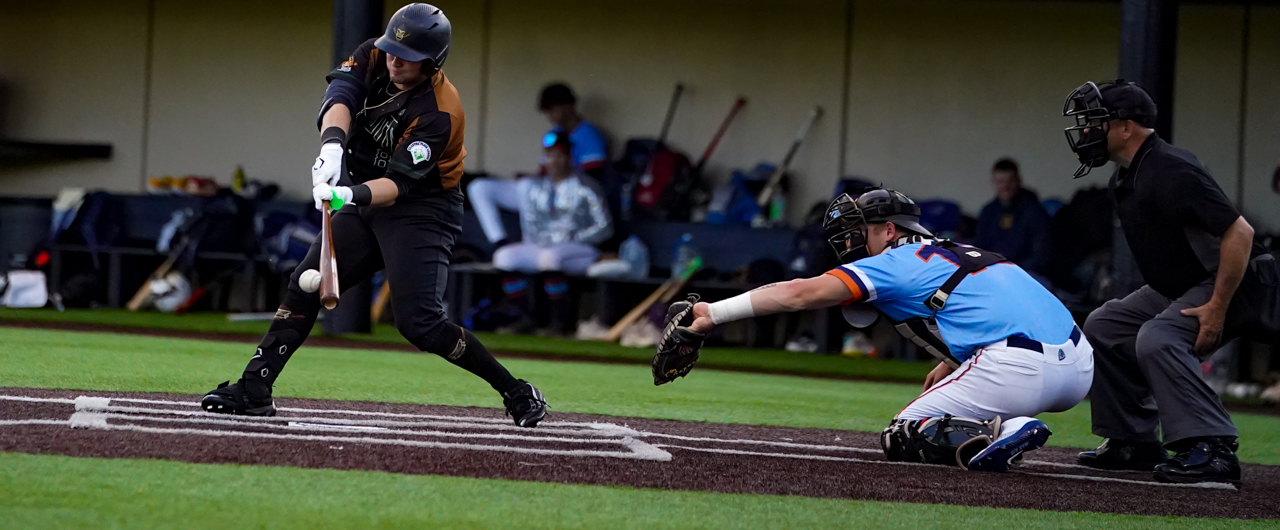
Growing up, but not out of the game
The faces playing baseball may change from year to year or even decade to decade, but the game remains largely the same. When we grow too old to take the field for a man’s game demanding a lot of boy in us to play it, we sit in the stands and remember our glory days on the diamond. We are fascinated. We applaud. We rejoice at the walk-off grand slam home run or the ninth inning slide into home plate to win the game.
Young and old, we marvel at the accomplishments wrought by the boys of summer.
The High Country is blessed to have organized, summertime ball being played not just by our kids competing in recreation leagues but at an even higher level by the Boone Bigfoots, featuring student athletes who take the field during the school year on college and university teams around the country.
The Bigfoots, named after the mythical creature said to haunt the Appalachian Mountains, compete in the Coastal Plain League, a Southern equivalent to the Cape Cod League made famous in the 2001 movie, “Summer Catch,” starring Freddie Prinze, Jr. and Jessica Biel.
The CPL teams have unusual names, similar to the Bigfoots, reflecting the local area: the Macon Bacon, Asheboro Zookeepers, the Forest City Owls, the Wilmington Sharks, the Florence Flamingos or the Wilson Tobs (think, “tobacco”), and more.

Like the other teams, the Bigfoots’ coaches and management recruit players from different schools. Because of the milder summer temperatures in the High Country and the beautiful App State facilities, it is an easy sell.
The Boone roster includes a couple of Appalachian State athletes (Braxton Church, Dante Chirico, Zach Lewis) and at least one, Tristan Salinas, having just graduated Watauga High School and headed to play at another NCAA Division I school, South Carolina.
Several NCAA Division I schools are represented, but still others compete during the school year as some of the better players at Division II and even Division III levels. Transylvania, Mars Hill, High Point, USC Beaufort, North Carolina Wesleyan, Presbyterian, Lenoir-Rhyne, UNC Pembroke, Long Island, and Western Carolina are among the less well-known names, all with good baseball programs.
The Ivy League is also represented, those schools generally regarded as among the most academically challenging, with a couple of players from Princeton University.
After competing in a lower division summer college league the last two seasons, the Bigfoots graduated to the higher level CPL in 2023.
Team organizer Bob Wilson, whose professional career as a television and film producer spanned at least three decades in California, revealed in a recent interview that he loves baseball at the collegiate level, was impressed with the facilities at Appalachian State, and made officials at the university an offer they couldn’t refuse.
“In the CPL, we are the only team organized as a non-profit organization. In my professional career as a film producer, I have been blessed, financially, so I committed 100 percent of our net proceeds to the App State fund to support student athletes in exchange for the opportunity to use Smith Stadium and Beaver Field as the Bigfoots’ home venue,” explained Wilson.

There are common themes among the players interviewed: the ability to concentrate on playing baseball and getting comfortable in a more competitive environment.
“I am very grateful for the opportunity provided me by Coach (Randall) Ortiz and Bob (Wilson),” said recent Watauga High School graduate Tristan Salinas, who will be playing for the University of South Carolina in 2024. “One of my coaches at South Carolina put it best. He said it is like driving a car. When you first get your license, you are comfortable at 30-40 miles per hour, then you get faster as you get better. Playing ball in the SEC you are facing pitchers throwing 80-90 miles per hour, perhaps even faster. This is a good chance for me to get used to that middle ground, maybe 75-85 miles per hour, before I get onto the bigger stage in Columbia.
“I have always loved playing travel ball during the summer and last year was my last year playing on the team I had been with for 13 years,” added Salinas. “This is an opportunity to continue playing in the summer, make new friends, branch out and improve my skills. It is a great new chapter of my life.”
Right-handed pitcher Luke Patton is one of those NCAA Division III players, attending Transylvania University in Lexington, Ky.
“After my freshman year this past season, my coach told me that playing for the Bigfoots would be a great opportunity to play with and against even better talent. And that is exactly what I am finding. Coming here, there are guys from big time programs, even Power 5 programs like Duke University and South Carolina, all baseball programs that are well known, like George Mason,” said Patton. “This is a great experience. In D3, there are things that you can get away with but down here, at this higher level, even small mistakes are exposed during a game. You have to be better prepared.
“It is a little different playing summer college ball without having to worry about academic studies,” continued Patton. “You are waking up in the morning and all you have to do is play baseball. It is a great feeling knowing that you don’t have to go home and study.”
After a June 4 win by the Bigfoots over the Asheboro Zookeepers, Caden Wagner analyzed his big hit, a home run in the seventh inning that helped propel the Bigfoots’ comeback victory.
“A couple of pitches earlier he was throwing off-speed on the outer half of the plate, so I was thinking to myself to try and stay in the middle of the field or try to catch a gap, don’t try to do too much. As it turned out, I connected with the ball just right,” Wagner recalled of his rocket that sailed over the 385-foot sign in left center.
Wagner hails from Parker, Colorado and attends school at the University of Northern Colorado, an NCAA Division I school competing in the Summit League against good baseball schools like Oral Roberts, North Dakota State, South Dakota State and Nebraska-Omaha.
“I played in the CPL last summer with Martinsville and Coach Randall Ortiz, our coach here at the Bigfoots this year. My summer last year was cut a little bit short in order to have some back surgery, so I wanted to come back out here and play a full summer for Coach Ortiz,” said Wagner.
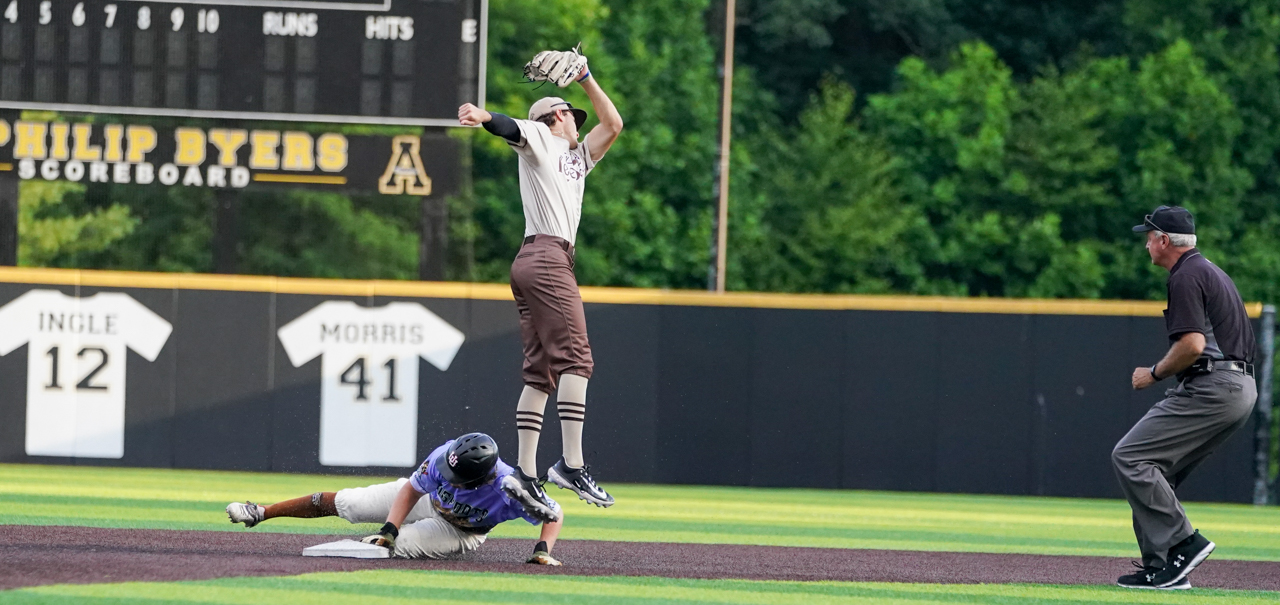
“We have fun. Summer ball in the CPL allows you to play pretty free and easy vs. playing college ball where you have to worry about academics, too,” said Wagner, a business and finance major in school. “Every summer, I come out here with a plan, knowing what I need to work on as an individual and then I get to take that back to the university and our school ball. That is the biggest thing, just able to focus on what you need to work on. You play baseball every day and put your focus there.”
Nick DiPietrantonio is one of two Ivy League players from Princeton University playing for the Bigfoots in 2023. Like Wagner, he also clubbed a big home run on June 4 against the Zookeepers that served as a catalyst for the Boone team’s comeback win.
“I played in the CPL last summer with Martinsville, too, so I am a little bit familiar with North Carolina but have not been here for an extended period of time. My hometown is Manalapan, New Jersey. I really like playing in this summer league because every day you wake up and get to make every decision based on baseball. We play ball almost every night and everything revolves around the competition. We get to hone-in on what we are trying to accomplish. I don’t have to worry about all the pre-med stuff during the summer!” said the future healthcare professional. “In school, there is a lot of balancing. Here, it is all about baseball.”
Catcher Braxton Church didn’t have much time to kick back and relax after his Appalachian State team went deep into the Sun Belt Conference tournament before losing to Southern Miss in the semifinals. Not only does he get to play home games in the familiar environment of Smith Stadium, but his family frequently gets to see him play since his hometown is Wilkesboro.
“This is awesome, being close to home and still getting to stay in Boone for the summer,” said Church. “This is like college ball, of course. There are guys from all over who can sling it and everybody competes. Having Hayden Cross as the Bigfoots assistant coach is terrific because I have learned a lot from playing behind him here, for App State, since he was the older catcher ahead of me. Now I am learning even more with him as my coach.”
Hayden Cross, once Church’s teammate but now officially his mentor, is taking the next step on a potential career by assuming a coaching role with the Bigfoots.
“I am pretty much done playing baseball,” said Cross. “I am out of college eligibility, but I get to spend another summer in baseball as a coach. I eventually want to get into coaching, so this is a great opportunity. This is good baseball. There are guys from really good college programs.”
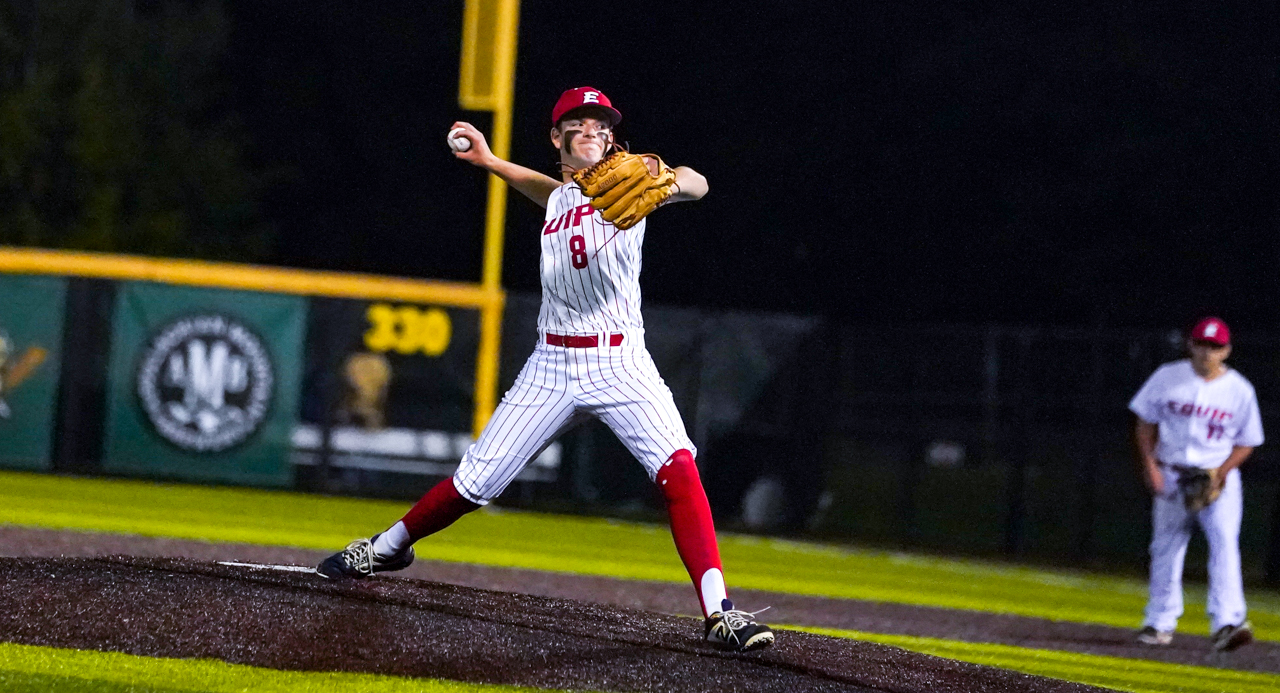
Although Cross had a final “look” recently from the Chicago Cubs, he said he is not banking on getting drafted.
“My degree is in education,” he said. “So, I would like to coach and teach at either the high school or college level. As a high school teacher, it would probably be in math.”
The guy charged with tying it all together for the Bigfoots in 2023 is head coach Randall Ortiz, an alum of Catawba Valley Community College and Wichita State University as a player. He is also beginning his fifth year with CVCC as a coach.
“In high school, I was a lot smaller than I am now,” said the man with the stocky build of a catcher. “So in high school, I began as a shortstop. Then halfway through my freshman year they made me the catcher after the regular guy got injured and I never looked back.”
Given their view of the game from behind home plate with the entire baseball arena in front of them, athletes who played the game as a catcher have a special perspective as they transition into coaching.
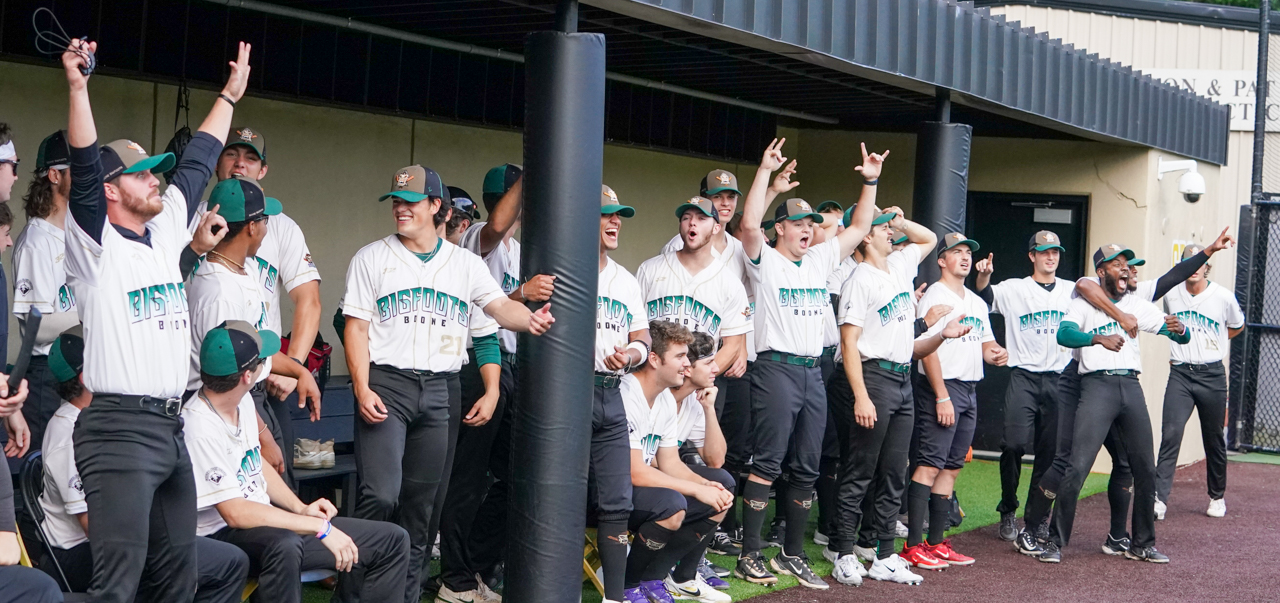
“I am definitely excited by this opportunity,” said Ortiz, his face breaking into a big smile. “Last year, I was in the CPL with the Martinsville team as a coach. I knew that eventually I wanted to be a head coach. I didn’t know how soon my chance would come, but it has been what I wanted. The opportunity here in Boone opened up and one of my friends from college got me connected with Bob Wilson. The first time I visited here and saw the field and facilities, I knew this was where I wanted to be, the head coach for the Boone Bigfoots.”
Ortiz echoed the common theme heard from among the players.
“Summer baseball in the CPL is good,” said Ortiz. “You have the players’ attention pretty much 100 percent. They aren’t having to worry about homework for their academic studies. Add to that I think we have a special group of players here this year. We have only been here for three weeks, but it has been awesome so far. The guys all get along with each other and they can focus on baseball, not worrying about school.”
When it comes to summer jobs, it doesn’t get much better than it is for the boys of summer.






